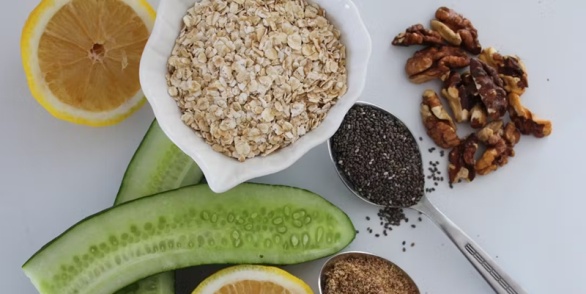Why Cutting Carbs is Key to Losing Weight
Understanding why cutting carbs is vital to losing Weight involves exploring the principles behind a low-carb diet and its effectiveness. This guide will provide insights into low-carb diet effectiveness, offer practical carbohydrate weight loss tips, and give a beginners perspective on cutting carbs.

1. Understanding Carbs and Their Part in Weight Gain
Carb Rudiments: Along with fats and proteins, carbohydrates are one of the three macronutrients and the primary energy source. They are found in food varieties like bread, pasta, natural products, vegetables, and desserts.
Influence on Glucose and Insulin: Blood sugar levels and insulin production are affected by carbs. Straightforward carbs can cause glucose spikes, prompting expanded insulin emission, which can advance fat stockpiling in the body.
2. The Viability of Low Carb Diets
Lessening Insulin Levels: Low carb slims help diminish insulin levels, prompting the body to consume and put away fat for energy instead of carbs.
Studies and Exploration: Various investigations have shown that low-carb diets can be more successful than low-fat eating regimens for momentary weight reduction. This is because of diminished craving and expanded fat consumption.
3. Tips for Losing Weight with carbohydrates Balanced carb Intake:
Taking out carbs isn't required. Centre around decreasing the admission of high-carb food sources and supplanting them with low-carb vegetables, lean proteins, and solid fats.
Seeing Great versus Awful Carbs: Pick complex carbs like entire grains, which are processed more leisurely and affect glucose less.
4. Cutting Carbs for Fledglings
Begin Step by Step: For amateurs, it's critical to begin progressively. Slicing carbs out of nowhere can prompt withdrawal side effects like weakness and desire. Begin by disposing of sweet bites and steadily diminish carb consumption.
Elective Food Decisions: Investigate low-carb options compared to your number one food sources. For example, try cauliflower rice rather than regular rice or zucchini noodles instead of pasta.
5. Benefits for Health and Long-Term Sustainability Using a Sustainable Approach:
For long-haul achievement, embracing a reasonable way to deal with cutting carbs is essential. This implies tracking down an equilibrium that works for your body and way of life.
Medical advantages Past Weight reduction: Reducing carbs can improve blood sugar control, reduce the risk of type 2 diabetes, and improve heart health, in addition to weight loss.
7. Consolidating Actual Work with a Low Carb Diet
Upgrading Weight Reduction Through Exercise: Consolidating a low-carb diet with everyday work can reduce Weight. Practice helps consume and put away fat, mainly when the body's low carb stores. Kinds of Activity for Ideal Outcomes: Participating in cardiovascular and strength-preparing activities can yield the best outcomes. This mix assists in working with muscles, which can help digestion and increase fat misfortune.
8. Figuring out Carb Cycling and Its Advantages
Carb Cycling Making sense of Carb cycling includes shifting sugar consumption on various days. This technique can be successful in getting thinner while avoiding the adverse consequences of a rigorously low-carb diet.
Executing Carb Cycling: Novices can begin with a straightforward daily schedule, such as having high-carb days on additional dynamic days and low-carb days on rest days. This technique can help in keeping up with energy levels and metabolic equilibrium.
9. Keeping an Eye on Your Diet and Losing Weight:
Monitoring Progress and Adjusting Keeping a food journal and keeping track of your Weight regularly can help you understand how well your low-carb diet is working. Changing Carb Admission on a case-by-case basis: Considering your advancement, you might have to change your carb admission. Consider further reducing carbs or consulting a nutritionist for tailored guidance if weight loss plateaus.

10. The Significance of Hydration and Electrolytes
Remaining Hydrated: While cutting carbs, it's crucial to stay hydrated all around. A low-carb diet can prompt a deficiency of water weight, and satisfactory hydration is significant for wellbeing and viable weight reduction. Keeping up with Electrolyte Equilibrium: Low-carb diets can disturb electrolyte balance. Counting electrolyte-rich food varieties or enhancements can assist with keeping up with this equilibrium and forestall issues like muscle spasms or exhaustion.
11. The Mental Part of Decreasing Carbs
Overseeing Carb Desires: Diminishing carb admission can prompt desires, particularly at the outset. Finding sound, low-carb choices can assist with dealing with these desires successfully. Close to Home and Mental Help: It's critical to have close to home and mental help while progressing to a low-carb way of life. Support gatherings, advising, or joining the web networks can be helpful.
12. Creative Cooking with Low-Carb Ingredients:
Investigating Alternatives and Recipes for the Diet Try out low-carb recipes and other options for your favourite high-carb foods. Cauliflower rice, zucchini noodles, and almond flour are astounding other options.
Growing Your Culinary Collection: Accept the change as an opportunity to try new, healthier, low-carb recipes and improve.
13. Understanding the Function of Fiber in a Low-Carb Diet Fiber Consumption:
Fibre is fundamental for stomach-related wellbeing and can help with weight reduction. High-fiber, low-carb food varieties like mixed greens, nuts, and seeds should be a part of your eating routine. Advantages of Fiber: Other than supporting processing, fibre assists in feeling full, which can decrease general calorie admission.
14. The Meaning of a Reasonable Eating Routine for Long Haul Wellbeing
Past Carbs: An All-encompassing Way to Deal with Sustenance: While cutting carbs can help with weight reduction, it's essential to guarantee you're getting a fair eating regimen. This incorporates sufficient protein, sound fats, nutrients, and minerals.
Counselling Sustenance Specialists: Consult a nutritionist before beginning any diet, especially one that involves significant changes like cutting out carbs, to ensure it is safe and suitable for your health and lifestyle.
Conclusion
Cutting carbs can be a critical procedure in weight reduction endeavours. People can effectively lose weight and improve their overall health at the same time if they understand the role that carbohydrates play in the body and take a balanced approach to reducing their carbohydrate intake by incorporating these comprehensive strategies and continuously monitoring and adjusting their approach.





